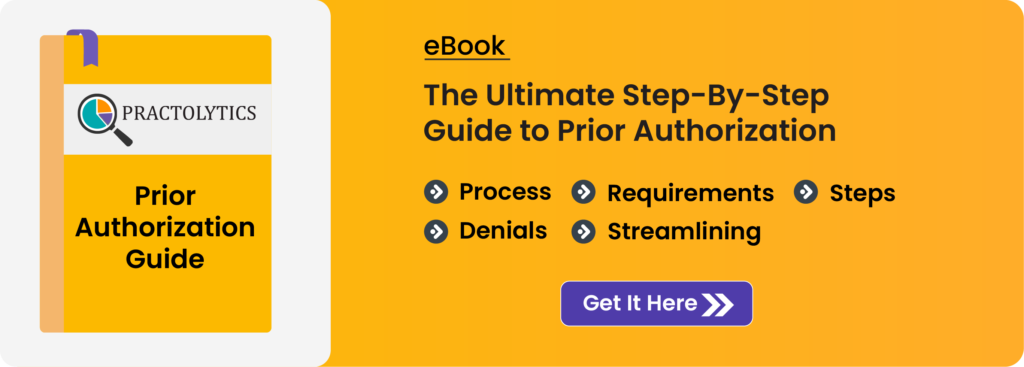Prior Authorization in Healthcare: The Shocking Reality
Prior Authorization has now become the talk of the hour for healthcare sectors. It has brought many to the debate indicating its efficiency and disadvantages. To any healthcare process, there are going to be pros and cons, it is up to the staff and facilities to carry out the PA process such that the demerits do not surface much.
But, while we say that, let us look into some facts that the prior authorization process possesses. So, any healthcare sector will know what to expect before setting out for optimizing their practices.
Table of Contents
PA process in a gist
Prior Authorization is most commonly carried out for highly expensive drugs to determine the necessity of the medication for the patient and verify the prescription for the cost coverage. So, the verification and approval must be done by the insurance provider company to help the patient obtain the prescribed medication.
The reason healthcare sectors consider the PA process required is to reduce errors, wastage, and unnecessary expenditure from the patient’s end.
Now, there are two kinds of Prior Authorization processes. Soft and Hard PA Process.
Soft PA process:
This is the most commonly followed kind of PA process. At first, the doctor prescribes the medication for the patient. Once it reaches the pharmacy, the staff verifies if the given prescription requires prior authorization and if yes, they will contact the doctor who prescribed the medication and inform them of the need. Now, at this point, the patient decides to either pay for the medication out-of-pocket or take the process forward to the insurance company. If they choose to take it ahead with the insurance company, then the healthcare practice contacts the insurance company fills out necessary forms, and then submits a formal authorization request. Once the approval gets authorized, the product will be delivered to the patient and the insurance company covers the cost.
Hard PA process:
When physicians resubmit the authorization request with more information as the request gets declined by the insurance company, it is called the Hard PA process. The denial could be due to errors in the application or if the insurance company suggests the patient for another process. This process can be lengthy and it only gets authorized after checking and seeing if all the required criteria match. Once it does, the medication is approved.
What does it say about the PA process? That the prescriptions can get rejected for many reasons.
Why is the PA procedure denied?
More than half the time, prescriptions are sent for prior authorization from the pharmacy. But the problem is that only a few patients receive the exact medicine that was prescribed in the first place by the physicians. So, the rest, who could not receive the prescribed medication will have to leave the entire treatment/therapy or be frustrated about their health even more.
The reason? Illegibility in the physician’s prescription. Most of the time, the medication prescribed might not be necessary for the given diagnosis.
Which prescription drugs need prior authorization?
Prior Auth criteria meet the need if the given prescription encompasses the following:
- Drugs with significant side effects.
- Drugs that do not meet the age criteria for the patient’s usage.
- Drugs with high doses (higher than normal level).
- Cosmetic drugs (like for hair growth).
- Very expensive drugs for serious conditions.
- Medicines for non-life-threatening ailments.
- If the prescribed drug has a less expensive alternative that is equally effective.
- Uncovered medication costs but is medically necessary for the patient, the physician must confirm the ineffectiveness of other alternates for the diagnosis.
There are even more reasons for which prior authorization is inevitable as it reduces the cost of treatment. However, it is a lot of work when it comes to the practice and takes quite a time for administration, communications, and never-ending paperwork.
Let us see some problems faced by practices during the PA processing:
- Taking up the physician’s time
Physicians and medical staff have frequently expressed their dissatisfaction with managing authorization activities while they have to focus on primary patient care requirements. When the pharmacy communicates with the practice to inform them of the prior auth requirement, physicians and staff have to get ahead with the verification and communication process to get everything right. This takes up a lot of their time.
Not just that, even after PA request submission, they must do frequent follow-ups. So, they must ensure that they file the forms with the necessary and correct info. This is even more frustrating for them and takes even more time to process. And they are increasingly burdened with the PA process and are radically looking out for alternatives.
- Cost for PA process
According to a study by Health Affairs,
Practices interacted with health plans for an average of $68,274 per physician per year when time is converted to dollars. This is equivalent between $23 and $31 billion per year
So, the savior itself comes with a price. Physicians across the globe have reportedly stated that they are spending long hours connecting and following up with insurance companies and getting through the whole process of Prior Authorization. So, when finding the total amount spent at the end of the year, it costs too much for the healthcare sector.
- Delay for patients
If the whole purpose of PA isn’t served right, then it is something that healthcare sectors must dive into to make right.
When patients are delayed from receiving their medication, they might consider choosing another practitioner or to leave the treatment as a whole. This will put them under pressure for not having control over their health.
The issue could be with anyone- the physician, the practice, the pharmacy, or even the insurance payer. Resolving this itself would delay the medication.
Prior authorization, according to a large number of physicians, hurts patient access to care, which in turn hurts clinical quality results and also has several risks on patient health.
- Prior Auth Management
The PA management can get challenging for practices mainly due to the difference in requirements from one insurance company to the other. The process of PA request submission also varies for different payers. So, practices cannot follow a standardized process for all the PA processing, thereby, draining all the staff and resources under a limited period.
Claims for the PA process get delayed for many factors including:
- Incomplete PA steps from the pharmacy and physician’s end.
- Missing or wrong information while filing forms (these include DOB).
- No proper billing information from the pharmacy’s end.
- Old or outdated information regarding the insurance.
- Claiming PA to the wrong payer.
- PA approved by the insurer but failed to notify the clinic or pharmacy.
- Expired approvals.
- Physicians failing to meet the payer’s guidelines (most common).
If you see, all these issues are associated when practices come into the picture. But bring in a third party, and practices and physicians need not take up the burden. Choose a partner who can single-handedly manage all your PA processing, right from when they receive the notification from the pharmacy and until they receive the reimbursements.
Practolytics will serve as your trusted partner who can manage and carry out all your PA process. We help practices attain maximum efficiency in their Revenue Cycle, credentialing, Prior auth, contract negotiation, and other services. Reach out to us to learn more!
ALSO READ – The Perks of Outsourcing Prior Authorization Services
Talk to Medical Billing Expert Today — Get a Free Demo Now!






